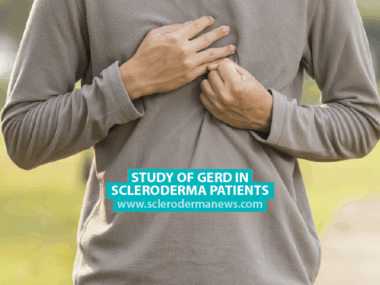The gastrointestinal problems of scleroderma are always with me
GI symptoms are my constant unwanted companion
Written by |

I think of scleroderma as my constant companion — one that tries to keep me from having a life of my own. Whenever I want to do anything outside of my home or lead a productive life, scleroderma always seems to hold me back. It’s like the friend I can’t take anywhere because they’re always doing things to embarrass me.
Of all the problems caused by my scleroderma, gastrointestinal (GI) issues are the worst. These are my most embarrassing and painful symptoms.
Stomach noises may be embarrassing, but they’re a sign that the GI tract is working as it should. These sounds mean that the food we’ve eaten is being propelled through our digestive system and is on its way to the intestines. In the past, I’d occasionally hear my stomach churning whenever I was especially hungry, and I could hear my intestines working to expel gas from my body.
If there’s anything worse than the dismay most people experience when their stomach makes embarrassing noises, it’s when those noises suddenly stop and you realize that something is wrong.
How scleroderma causes gastrointestinal problems
Scleroderma replaces muscles and nerves in the walls of GI organs with scar tissue. That results in a loss of function in these organs, which can lead to problems such as nausea, bloating, abdominal cramping, gastroesophageal reflux disease (GERD), and food getting stuck.
Following are some of the GI symptoms I experience:
GERD: My GERD feels like it’s gotten a lot worse over time. I had my first episode of reflux around 1995. It doesn’t always hurt when stomach acid comes up into my esophagus and throat, but at the times when it does, it’s extremely painful.
One night, not long after I was diagnosed in the ’90s, I had an attack of reflux that burned my throat. The stomach acid came up all the way into my mouth, and it felt as though I’d drunk acid. Desperate for relief from the pain, I drank some leftover lidocaine solution that I had from the dentist. (I wouldn’t recommend this choice to others.)
At other times, the painful stomach acid has gone into my lungs, and I’ve struggled to cough it up.
Early satiety: Bloating and feeling full after eating only a little bit of food are known as early satiety. It can be caused by conditions such as GERD or gastroparesis, which causes delayed emptying of the stomach’s contents. Both may be symptoms of scleroderma.
Malabsorption and diarrhea: Atrophy of the smooth muscle layer in GI organs can inhibit peristalsis, which moves food through the digestive process. Dysfunction of the small intestine can lead to small intestinal bacterial overgrowth, malabsorption (which can result in weight loss and malnutrition), diarrhea, and constipation. I have one nutritional drink a day to help with this problem.
Constipation: When scleroderma affects the functioning of the large intestine, waste material (feces) can become stuck. As a result, I experience constipation.
Fecal incontinence: I started having instances of fecal incontinence around 1997 and continue to experience this problem today. I never know when these accidents will occur because I can’t feel them coming on. I’ve read that problems with fecal incontinence are underreported because many patients are embarrassed to talk about it.
To help with this issue, I take stool softeners daily. But I still experience fecal incontinence several days a week.
The gastrointestinal problems caused by scleroderma have narrowed my world and made it smaller. I can’t take this companion anywhere — and it won’t leave.
Note: Scleroderma News is strictly a news and information website about the disease. It does not provide medical advice, diagnosis, or treatment. This content is not intended to be a substitute for professional medical advice, diagnosis, or treatment. Always seek the advice of your physician or other qualified health provider with any questions you may have regarding a medical condition. Never disregard professional medical advice or delay in seeking it because of something you have read on this website. The opinions expressed in this column are not those of Scleroderma News or its parent company, Bionews, and are intended to spark discussion about issues pertaining to scleroderma.







Deme Montgomery
Thank you for being so open and talking about GI issues! I totally understand how you feel and I appreciate you bringing awareness to this topic!!
Patsy
Thank you for your post I have the same issues with reflux and recognise the drinking acid part.
This happened to me most nights until my drug was changed to Esomeprazol 20mg twice daily. I feel a big improvement in both my reflux and constipation, haven’t had an episode since starting the drug so I feel the esomeprazole must be helping with both problems.
I have home oxygen now which helps tremendously but have just been told Scleroderma is now attacking my liver so just waiting for more meds to slow that down.
You describe scleroderma as your constant companion, perfect description of an unwelcome guest.
Thank you for posting I’ve never thought of acid getting into lungs but I cough constantly after an episode so feel that’s what’s happening.
Best wishes for the coming year x
Matilda Tumim
Thanks so much for this piece about a problem that affects me very similarly ie GERD, Gastroparesis, SIBO, chronic pseudoobstruction, slow transit bowel and incontinence. I now have a colostomy and it has improved my quality of life to some extent. However I now also have symptoms of some form of of colitis so am waiting for an urgent colonoscopy. I’m thankful that so far I don’t have other organ involvement eg lungs, heart … but as you say the malabsorption, pain being unable to to go out, enjoy meals with family and friends and just have a break - is really tough
Francisca Drenkow
Your post hit nail on the head for me. I too take my GI problems every where I go, along with my purse which is loaded with supplies in case there are bowel issues. I recently had a sacral stimulator “installed” , it’s supposed to help my bladder urgency and bowel incontinence. Thank you for sharing your experience. We all feel that we’re all on this Scleroderma journey alone.
Dawn Trykowski
I was diagnosed with SD in 1997 ,many issues that have been embarrassing 😳, I found that group therapy has helped me. SPEAKING with others who have chronic disease makes me/us feel less alone. Thanks for your support. Dawn
Michele Herbert
Thank you for sharing. I too have these symptoms you just have mentioned. It is something that had to become a part of my life as I redirect my path with Scleroderma. Lots of weight loss and dirrahea. So much that I ended up in the hospital because my kidneys were not doing good.
Mary Ann White
I’ve lived with GI. Issues since I was diagnosed about 20 years ago. Fecal incontinence is certainly a challenge! Timing meals and layers of protective padding help a lot. I just keep on goong as much as possible. Regular exercise and over-the-counter anti-acids and anti-diarrhea meds are a blessing. I’m glad to read about others’ experiences and advice.
I would appreciate more of this practical information. Exhaustion and dry-mouth are two topics that should be discussed in this forum. I lost most of my upper molars before my dentist’s assistant figured out the dry mouth. The rheumatologist never discussed ANY of the daily problems caused by scleroderma. Thank you.
Dana McCaron
My current pulmonologist was the only one who told me that the stomach acid could end up in my lungs and that is often what causes progression of lung disease. He recommended that I stop eating by 6pm and sleep with my head elevated by either an adjustable bed, blocks under the frame of the bed at the head, or even a wedge pillow. I have taken his advice and have noticed a huge improvement in my reflux! I used to wake up chocking several times a night from the reflux and that was happening despite taking my Omeprazole before dinner. He also told me not to drink during the night. If I got thirsty to only have small sips of water, not a whole glass full.
gaynell harding
Thank you very much for your information, it is so appreciative to get all the info I can get, I was diagnosed with limited scleroderma in Dec/2000. I have had constant raynauds since July of 2000. I had a heart attack June of the same year and had a CABG surgery 6/5/2000. The cold fingers started right after my surgery which I thought was result of medicine I was on. It was not we figured out. I am now dealing with gastrointestinal problems which is very hard. I am learning all about these issues as I try to handle it, thank you again, Gaynell
Tili
Thank you for highlighting a common part of the disease most docs are not familiar with. I have sine ssc and small intestine is affected(recurrent non mechanical ileus most likely fibrosis/scar tissue/inflammation related). I find that the natural and alternative medicine community, as well as forums like inspire, is the most well versed in support and how to handle issues to avoid the hospital. A great resource for natural substances and holistic wellness that can help relieve and eliminate issues.
Kathy Brokaw
I could have written your post, as I have experienced every single issue you mentioned! It’s true that these are things that we are reluctant to talk about. Like you, they often keep me at home instead of doing things I’d like to do. In addition to GI problems, Raynaud’s symptoms are always with me, although I seldom notice my purple fingers as that’s my normal!
Joan
Has anyone had a successful surgery to correct the acid reflux from coming up? That’s where I am at with my journey.
Lorraine Wright
Thank you so much for your post. I identify with everything you said. One of the most disappointing areas for me is my level of exhaustion. I’ve always been active but now spend a great deal of time “resting”. I had to give up line dancing and can’t run around or lift my beautiful grandchildren any more. I’ve learnt to deal with the fecal incontinence situation, but don’t take the chance of going into the swimming pool or going for a relaxing massage or spa treatment! Scleroderma is cruel and can rob you of the life you hoped for on retirement. Whoever called these the Golden Years obviously didn’t have scleroderma. I wish you all the very best for 2025.
Debbie
Although sorry to read about your "companion", thank you for sharing your experiences. Best Wsihes to you.
Janice
I feel there is someone else out there who understands, I’ve had this forever but recently(2021) diagnosed with Scleroderma/CREST. The things that have been happening to me has been distressing to say the least. Thank you for sharing
Pamela
Thank you, Tomisa, for sharing one of the most frustrating aspects of this disease. Loss of control of the digestive tract can also cause reflux to be a continual problem. Even if I avoid sugar, any spicy foods, the usual culprits, I still get a minor sensation of reflux, and now have Barrett's Esophagus, which puts me at risk for cancer of the throat. This disease can create havoc, but I am lucky to have handled it pretty well, and I've seen people with Scleroderma that are unable to live without constant help.
Linda Durnan
I have some of the symptoms that you mention and feel so supported to know that there are others out there like me. I find it helpful to hear about ways to handle these issues. For those who have severe Raynaud's being on Tadalafil has helped a lot. I also have so many pairs of gloves for different situations including heated gloves like motorcycle riders use. I find keeping my hands constantly warm helps them, even with the ulcers. I have the esophageal problems with the fluids not going down. It might be also filling up my lungs at this point and one of my doctors is talking about possibly putting in a pacemaker for the digestive system if tests reveal fluid in the lungs. Anyone have experience with this?
Kathy Brownlow
Thankyou Tomisa for such a open honesty discussion of these autoimmune diseases and dysfunction! I also live with everything you mentioned along with what most all other comments. It's nice to know that WE are not alone!.
I also have raynauds and a rare blood disorder called Porphyria. My dermatologist discovered the porpyria when I went to find out why I was getting all these ulcers all over my hands especially on my knuckles and they would not heal. Porphyria described that my body makes too much iron when exposed to the Sun rays and drinking alcohol. So in 2009 I finally gave up drinking after I admitted that I am an alcoholic and needed help. I was a bartender for 35 years and a big cigarette smoker and tanning fanatic.. The dermatologist also diagnosed my diffuse systemic sclerosis. Ironically though I'm anemic. I also get calcinosis and have osteoporosis too.Recently had a left and right heart catherazation to check my heart blockage and PAH levels. Luckily My diagnosis was that I just have PAH mildly. No Stent was required either. But could need one soon. Even though I have COPD. Not on any breathing treatment...I will close for now and maybe just write about all these different disorders in a blog on its own!!! Sorry that I rambled on and on. I'm 65 and grateful to be alive!.
Graham Morris
Just a thought regarding your GERD, seek medical involvement and ask if OMEPRAZOLE would help. I am 68 years old, have suffered from Scleroderma since teenage years, I used to suffer with reflux all the time, however since taking Omeprazole, the symptoms have gone!
Valerie d Jenkins
I have had systemic scleroderma since the 90's and Social Security will not help me. Does anyone know whether I can get help? They always turn me down.
Sandra Dixon
Sorry Social Security is turning you down. Scleroderma is in the blue book of diagnosis. My thought it is important to document the impact on your work ability, days missed, rest periods, activity levels, pain management etc and have regular Dr appointments that also address these items.
I. Thurnell.
I have been diagnosed with Scleroderma for 50 years . I agree…my troubles with GI symptoms are quite a secret. Particularly troublesome . I do tolerate the DIGESTIC ‘ revolutionary formula ‘Constipation relief and IBS -C medication, after much trying of various others . Research is important , in every aspect of Scleroderma, but oh! definitely with bowel troubles . Rarity . Remains unmentioned . But because of your helpful article,here I am, setting my case .
.I never know whether this remedy to constipation will or will not work…however , if there is obstruction, I do know that that has a lot to do with my rectum getting narrower, the same as my mouth opening does Glycerin suppositories do, usually, but not readily , do act on the rectum , relaxing it, I suppose ? I am very elderly, and have had surgical intervention ( 5 ) to treat anal fistulas ..that no doubt , has been a contributor to the scarring and loss of adequate working .
I had no help, rather derision, I would say, from hospital professionals when I mentioned suppositories .
As for laxatives, the one which I tolerate ‘ is Digestic revolutionary formula , constipation relief and IBS -C.’ Worth a try.
Niloofer F. Desai
I have also been experiencing the GI issues related to Scleradoma. Yes it is indeed, frustrating to say the least. Makes you not want to leave your Home, with fear of having an episode. Ambassaring to say the least.
Sheryl
Hi Tomisa. Your article on GI diffuses in Scleroderma was great. I’ve had limited Scleroderma for 50 years although it took years to get diagnosed, finally in 1991. In 2024 I had a Medtronic sacral stimulator implanted in my butt that has finally stopped the horrible fecal incontinence I’d had for 20 years. The implant is high up so I’m not sitting on it but the internal wire leads down to my lower spine. Now I have 2-3 bowel movements in the morning, usually semi-solid and I’m fine the rest of the day. It took turning it up gradually for about 3 months before it really started working- I’m up high as they allow now. I still wear pads as a back-up but they aren’t usually needed. In case this might help you and others. I’m also a RBK amputee due to a blood clot in my foot from Scleroderma. Be well and thank you.
Stephanie J Black
Thank you. Newly diagnosed. Continue with your Courage!
Judith jubeh
Incontinence, fecal is the worse and getting sick so easily is another biggie